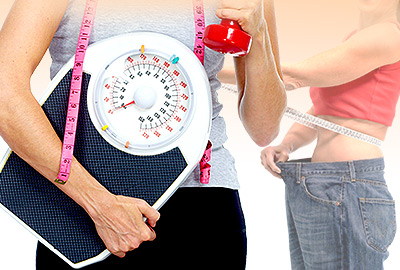Gaining on average of 1.5 lb. (0.7 kg) per year throughout the menopausal transition, women are likely to struggle with various physical and psychological issues, from body image to heart disease.1 Luckily, there are ways to counteract menopausal weight gain and enjoy good health and self-confidence for years to come.
Keep on reading to explore the best weight gain treatments, from natural to conventional, so that you can step into this new life phase with a healthy weight and optimal well-being.
Three Approaches to Treating Weight Gain
Women can consider three levels of treatment for weight gain: (1) Lifestyle Changes, (2) Alternative Medicine, and (3) Medications and Surgery, beginning with the most natural options and moving to more conventional ones if necessary.
Lifestyle Changes for Weight Gain

While the first level of treatment for weight gain involves the lowest risk, it conversely demands the most self-control. However, lifestyle changes can help prevent menopausal weight gain and improve overall well-being.
Fundamentally, treating menopausal weight gain boils down to two things: improving one's diet and staying physically active to speed up metabolism and balance hormones, while implementing other wholesome habits for improved results.
Nutritious Diet
Learning what and how much to eat to stay in optimal shape are key elements of composing a well-balanced menopause diet. Women are advised to opt for frequent, but moderately portioned meals made with whole ingredients, like:
- Phytoestrogen-rich foods cover various types of foods that contain estrogenic compounds, helpful in balancing hormone levels and reducing menopausal symptoms, such as weight gain.
Soy, flaxseed, yams, tomatoes, cauliflower
- Lean protein can increase satiety, speed up weight loss, and help build and maintain healthy muscle mass that middle-aged women are at risk of losing.2
Beans, fish, soy, eggs, chicken, dairy
- Healthy fats, as an important component of a balanced diet, protect the heart, regulate cholesterol levels, reduce high blood pressure, and more.3
Avocado, olive oil, sacha inchi, salmon, sunflower seeds
- Complex carbohydrates raise blood sugar levels slowly and contain fiber that helps with menopausal weight loss.4
Quinoa, brown rice, whole wheat pasta, oats
- Water is an integral part of a nutritious diet and a healthy way to control weight gain during menopause. While individual needs might vary, adequate daily fluid intake for women is 11.5 cups (2.7 liters).5
Regular Exercise
Staying physically active can not only control weight gain during menopause, but also promote hormonal balance, strengthen the whole body, improve bones, boost mood, release stress, and help relieve other menopause symptoms.
Amount: The goal for healthy adult women is 150 minutes a week of moderate exercises or 75 minutes per week of vigorous aerobic activity, alongside muscle-strengthening workouts twice a week.6
Type: Cardio workouts include biking, running, or swimming, while muscle-strengthening routines may consist of working with resistance bands or doing yoga.
Useful Tips: To stick to the workout regimen for longer, it is better to choose exercises that one enjoys. It could be talking brisk walks in the morning, riding a bike, or signing up for a dance class.
Precautions: Staying away from strenuous exercise, like endurance training, is recommended for all middle-aged women. For beginners, it is safer to start with short workouts and gradually build up to a higher level.
Wholesome Habits
To nourish the body from the inside out and complement one's efforts to control weight gain, women are encouraged to instill wholesome practices for ultimate results. They might include the following:
Getting adequate sleep is crucial to losing or maintaining proper weight in menopause as lack of sleep can affect women's eating habits and make them more likely to overeat to boost energy.
Finding an accountability partner can help middle-aged women keep up with a weight gain treatment plan, receive encouragement in times of doubt, and make it more enjoyable.
Reducing stress through yoga, meditation, or deep breathing exercises can help women balance their emotional states, reduce their susceptibility to sudden cravings, and improve overall mood.
Controlling addictions to alcohol, nicotine, and excess caffeine should be a must for middle-aged women seeking to improve their health and quality of life.
Alternative Medicine for Weight Gain

Alternative medicine encompasses numerous approaches to menopause weight loss, the safest and most effective ones being herbal supplements that address the root cause of weight gain, hormonal imbalance.
There are two types of herbal supplements that might complement a weight gain treatment plan: phytoestrogenic and hormone-regulating supplements.
Phytoestrogenic Supplements
Phytoestrogenic supplements, such as black cohosh, contain phytoestrogens, or estrogenic compounds, found in plants. Since these compounds mimic the actions of estrogen in the body, supplying them can help balance estrogen levels and treat weight gain. However, the presence of outside hormones can make the body less able to produce natural hormones, resulting in a deficiency in the long run. As such, extended use of phytoestrogenic supplements is not recommended.
Hormone-Regulating Supplements
Hormone-regulating supplements, such as Macafem, do not contain plant-based hormones. Rather, they nourish the endocrine glands, supporting their own production of hormones and, ultimately, leading to estrogen and progesterone balance, which is necessary for proper metabolism and a healthy weight. With virtually no side effects, hormone-balancing supplements are considered the safest and most effective for treating weight gain and other symptoms of menopause.
From Nature and Health Magazine, Dr. Chacon says:
"Macafem's nutrients help restore natural hormones in women. Unlike hormone drugs, which are basically resumed in taking synthetic hormones, Macafem acts totally different in your body. It nourishes and stimulates your own natural hormone production by inducing the optimal functioning of the pituitary and endocrine glands." Click on the following link if you wantto learn more about Macafem.
Many middle-aged women striving to keep the pounds off find that combining the first two levels of weight gain treatments - lifestyle adjustments and herbal supplements - gives them the best and lasting results. For some women, however, a more conventional treatment approach, consisting of medications and surgery, might be necessary.
Medications and Surgery for Weight Gain

Third tier interventions to control weight gain involve the highest risks and the highest costs. However, they are might be necessary for women whose weight puts them at a higher risk of serious health complications, like heart disease.
The specific weight gain treatment will be thoroughly evaluated on a one-on-one basis and might include the following:
Medications
- Hormone replacement therapy (HRT) used to be the most popular treatment for weight gain and other menopause symptoms. However, since the discovery of potential health risks involved in its use as described in the studies below, HRT is now prescribed with caution and generally reserved for severe symptoms.
- Other medications that suppress appetite or increase satiety, such as semaglutides, might be prescribed to control weight gain during menopause in women whose:9
- Body mass index (BMI) is above 30 kg/m2, or
- BMI is 27 kg/m2 and who have certain medical problems, like hypertension.
Surgery
Weight loss surgery, medically known as bariatric surgery, is the last resort of treatments of menopausal weight gain. It consists of making physical changes in the digestive tract to help women lose weight.
Because of the risks involved in the surgery, it is generally only performed in two cases:10
- A woman's BMI is above 40 kg/m2, or
- A woman's BMI is 35 kg/m2 and presents other health problems, including diabetes, sleep apnea, or heart disease.
Since conventional methods of controlling menopausal weight gain are typically not free of serious side effects, women nowadays tend to lean towards blending lifestyle changes with herbal supplements for ultimate results and long-lasting relief the natural way.
A Safe Way of Treating Weight Gain
Implementing Lifestyle Changes:
- Eating small, frequent meals with lean proteins, complex carbs, and healthy fats
- Combining regular cardio workouts with muscle-strengthening exercises
- Getting enough sleep and reducing stress with meditation or deep breathing
- Finding an accountability partner for encouragement
And Taking Herbal Supplements:
- Phytoestrogenic herbal supplements, like red clover or black cohosh
- Or natural hormone-regulating supplements, like Macafem
Sources
- Annals of Behavioral Medicine. (2003). Lifestyle intervention can prevent weight gain during menopause: Results from a 5-year randomized clinical trial. Retrieved January 18, 2021 from https://link.springer.com/article/10.1207/S15324796ABM2603_06
- Better Health Channel. (2018). Menopause and weight gain. Retrieved February 27, 2020 from https://www.betterhealth.vic.gov.au/health/conditionsandtreatments/menopause-and-weight-gain
- Harvard Health Publishing. (2019). Winning the weight battle after menopause. Retrieved February 27, 2020 from https://www.health.harvard.edu/womens-health/winning-the-weight-battle-after-menopause
- Mayo Clinic. (2019). Menopause weight gain: Stop the middle age spread. Retrieved February 27, 2020 from https://www.mayoclinic.org/healthy-lifestyle/womens-health/in-depth/menopause-weight-gain/art-20046058
- Menopause Review. (2015). Guidelines for dietary management of menopausal women with simple obesity. Retrieved February 27, 2020 from https://www.ncbi.nlm.nih.gov/pmc/articles/PMC4440197/
- Office on Women's Health. (2018). Menopause and your health. Retrieved February 27, 2020 from https://www.womenshealth.gov/menopause/menopause-and-your-health
- Office on Women's Health. (2019). Weight loss and women. Retrieved February 27, 2020 from https://www.womenshealth.gov/healthy-weight/weight-loss-and-women
- The North American Menopause Society. (2018). Midlife Weight Gain—Sound Familiar? You're Not Alone. Retrieved February 27, 2020 from https://www.menopause.org/for-women/menopause-take-time-to-think-about-it/consumers/2018/01/23/midlife-weight-gain-sound-familiar-you-re-not-alone
Footnotes:
- The North American Menopause Society. (2018). Midlife Weight Gain - Sound Familiar? You're Not Alone. Retrieved February 27, 2020 from https://www.menopause.org/for-women/menopause-take-time-to-think-about-it/consumers/2018/01/23/midlife-weight-gain-sound-familiar-you-re-not-alone
- The British Journal of Nutrition. (2012). Dietary protein - its role in satiety, energetics, weight loss and health. Retrieved February 27, 2020 from https://www.ncbi.nlm.nih.gov/pubmed/23107521
- Harvard Health Publishing. (2019). The Truth about Fats: Bad and Good. Retrieved February 27, 2020 from https://www.health.harvard.edu/staying-healthy/the-truth-about-fats-bad-and-good
- Harvard T.H. Chan School of Public Health. (n.d.). Carbohydrates and Blood Sugar. Retrieved February 27, 2020 from https://www.hsph.harvard.edu/nutritionsource/carbohydrates/carbohydrates-and-blood-sugar/
- Mayo Clinic. (2018). Water: How much should you drink every day? Retrieved February 27, 2020 from https://www.mayoclinic.org/healthy-lifestyle/nutrition-and-healthy-eating/in-depth/water/art-20044256
- American Heart Association. (2018). American Heart Association Recommendations for Physical Activity in Adults and Kids. Retrieved February 27, 2020 from https://www.heart.org/en/healthy-living/fitness/fitness-basics/aha-recs-for-physical-activity-in-adults
- JAMA. (2002). Risks and benefits of estrogen plus progestin in healthy postmenopausal women: principal results from the Women's Health Initiative randomized controlled trial. Retrieved February 27, 2020 from https://www.ncbi.nlm.nih.gov/pubmed/12117397?dopt=Abstract
- The Lancet. (2019). Type and timing of menopausal hormone therapy and breast cancer risk: individual participant meta-analysis of the worldwide epidemiological evidence. Retrieved February 27, 2020 from https://www.thelancet.com/journals/lancet/article/PIIS0140-6736(19)31709-X/fulltext
- Mayo Clinic. (2020). Prescription weight-loss drugs. Retrieved February 27, 2020 from https://www.mayoclinic.org/healthy-lifestyle/weight-loss/in-depth/weight-loss-drugs/art-20044832
- Mayo Clinic. (2017). Gastric bypass surgery: Who is it for? Retrieved January 8, 2024 from https://www.mayoclinic.org/healthy-lifestyle/weight-loss/in-depth/gastric-bypass-surgery/art-20046318



